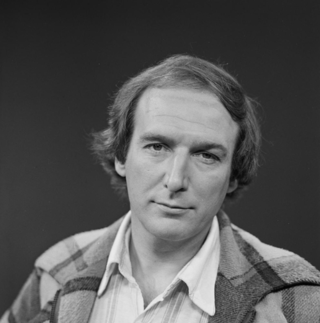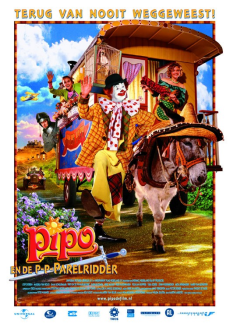Rob de Nijs | |
|---|---|
 Rob de Nijs in 2008 | |
| Born | Robert de Nijs 26 December 1942 |
| Nationality | Dutch |
| Occupations |
|
| Years active | 1960–2022 |
Rob de Nijs (born 26 December 1942) is a Dutch singer and actor, active since the 1960s.
Rob de Nijs | |
|---|---|
 Rob de Nijs in 2008 | |
| Born | Robert de Nijs 26 December 1942 |
| Nationality | Dutch |
| Occupations |
|
| Years active | 1960–2022 |
Rob de Nijs (born 26 December 1942) is a Dutch singer and actor, active since the 1960s.

De Nijs, backed by The Lords, won a talent-contest in 1962 and released his first single in 1962, "Ritme van de Regen". In 1965 De Nijs split from The Lords because they signed their own record-deal at another label; he embarked on a joint circus-tour with Johnny Lion.
By 1967, De Nijs was a free agent; he performed at small venues and worked as a bartender for a living. His attempts to keep up with the zeitgeist , including "Bye Bye Mrs. Turple", failed; he only made the headlines by marrying his girlfriend Elly in 1968. [1]
In 1969 De Nijs took part in the Dutch heat of the Eurovision Song Contest and through musicals like Sajjuns Fiksjen he landed himself a role in children's TV-series Oebele . This was followed in 1972 by Hamelen in which he played Bertram Bierenbroodspot.
Singer Boudewijn de Groot and songwriter Lennaert Nijgh helped De Nijs relaunch his singing career; in 1973 he was back in the charts with "Jan Klaassen de Trompetter".
The hits continued through 1975-1976, notably "Malle Babbe" and "Zet een Kaars voor Je Raam" (a Dutch translation by Lennaert Nijgh of David McWilliams's "Can I Get There by Candlelight?"). In 1977 De Nijs released Tussen Zomer en Winter, a concept-album chronicling the change from a hot summer's day to a cold winter's night, which starts with the hit song "Het Werd Zomer", a translation from the Peter Maffay song "Und Es War Sommer", and ending with "In De Winter", a translation of the Janis Ian song "In The Winter". The album also features translations of Lou Reed's "Perfect Day" and The Beach Boys' "Disney Girls (1957)".
In 1980 De Nijs released Met Je Ogen Dicht("With Your Eyes Closed") which included the top 10-hit "Zondag" and became the Netherlands' best-selling album of the year. He met Belinda Meuldijk who gave up her own singing-career (after releasing only one single in 1979) to become his chief-songwriter and his second wife (they married in 1984). The first efforts of their collaboration were collected in 1981 on the album De Regen Voorbij ("Past The Rain").
In 1985 De Nijs had a Christmas #2-hit with the peace-anthem "Alles Wat Ademt" from the album Pur Sang; the English version, "Let Love Be The Answer", was later recorded by US-exile singer Joe Bourne for his Bourne in Holland-album of translated covers. In 1986 De Nijs released an album of covers from the 1950s/1960s-era; it included his version of "Living Doll"shortly after the Comic Relief-remake topped the charts.
In 1987 he celebrated his silver jubilee; he re-recorded "Ritme van de Regen" for a Best Of-album and made a guest-appearance in television-series De Band as himself. He also released an album titled Zilver (Silver) which mostly contained his interpretations of famous Dutch songs.
In 1989 De Nijs released De Reiziger (Travelling Man) featuring the bilingual duet "Ik Hou Alleen Van Jou". At the end of the year he wore his Bertram Bierenbroodspot-outfit again for a reunion with the leading-actors of Hamelen.
In 1990 Stranger In Your Land was released, his first album of English originals plus translations of "Zonder Jou" ("On My Own"; 1981 duet with Demis Roussos), "Bo" (1983) and "Toerist In Het Paradijs" (1989) which became the title-track. The former ended up as the B-side of the "Girls For Sale"-single. In 1992, De Nijs appeared as a judge during the finale of the nl:Kinderen voor Kinderen festival, where he also performed the VIP-version of Allemaal kabaal (originally from the 11th edition of Kinderen voor Kinderen) with 2 children's choirs (De Waagzangertjes from Alkmaar and De Blokskes from St. Genesius-Rode, Belgium). In 1996 De Nijs scored his first #1-hit with a remix of "Banger Hart".
De Nijs entered the first decade of the 21st century with a knighthood and released albums with translations of Christmas-songs and French chansons (including "This Melody" for which Julien Clerc was flown in to sing the French parts). Meanwhile, he separated from Meuldijk after twenty years; he married for the third time and became a father again. De Nijs was 70 when he welcomed his third son Julius.
In 2010 De Nijs released the back-to-basics-album Eindelijk Vrij (Free At Last) which he recorded in the US. In 2012 he embarked on his 50th anniversary tour.
In 2014 De Nijs released an album called Nieuwe Ruimte (New Space) with contributions from well-known songwriters like Jan Rot, Boudewijn de Groot, and Daniel Lohues ; the latter two reprising their earlier collaborations with De Nijs.
In 2016 De Nijs was honoured with the Radio 5 Oeuvre Award and a tribute-concert.
In 2017 De Nijs released Niet voor het laatst (Not for the Last Time) ; on this album he collaborated with Meuldijk again and sang a duet with his son Robbert.
In September 2019, De Nijs announced his retirement from performing after being diagnosed with Parkinson's disease. A farewell-tour and a new album were scheduled for 2020, but postponed because of the corona pandemic. On March 31, 2020 he appeared on the demissionary talkshow De Wereld Draait Door (The World Continues to Turn) to perform two new songs. [2]
In 2021, De Nijs played the first of his two remaining farewell-shows in Belgium; the second was scheduled for 2022.

André Gerardus Hazes was a Dutch singer and actor. As an accomplished levenslied singer, Hazes recorded 36 studio and live albums, and 55 singles prior to his death in 2004. His music is still well-known in the Netherlands and Flanders, known for sentimental and simple lyrics.

Peter Koelewijn is a founding father of Dutch-language rock and roll. Koelewijn is also a successful producer and songwriter for other Dutch artists. His most famous song is "Kom van dat dak af".

Frank Boudewijn de Groot is a Dutch singer-songwriter, known for "Welterusten Meneer de President" (1966).

BLØF is a Dutch rock band founded in Vlissingen, Zeeland, by bassist Peter Slager. It currently consists of Slager, Paskal Jakobsen, Bas Kennis (keyboards), and Norman Bonink (drums). Former members are drummers Henk Tjoonk and Chris Götte. The band's four members write the music together, but Slager is solely responsible for lyrics.
"Welterusten, meneer de president" is a 1966 Dutch-language Dylanesque protest song, sung by Boudewijn de Groot. Like most of his other songs, it was co-written by songwriter Lennaert Nijgh. The music was composed by Boudewijn de Groot himself. The song is a protest against the war in Vietnam and the US president of the time, Lyndon B. Johnson and solidified De Groot as a protest singer.

Jan Smit is a Dutch singer, television host, and actor. Smit mostly sings songs in the Dutch language, in a genre known as palingsound. In addition to his solo career, in 2015 Smit joined the schlager trio KLUBBB3, and in 2017 The Toppers. As a TV presenter, he has worked on programs like the Beste Zangers and Sterren Muziekfeest op het Plein Since 1999, Smit has been serving as an ambassador for the SOS Children's Villages.
Frizzle Sizzle were a Dutch teenage girl group of the 1980s. Their biggest hit was "Alles Heeft Een Ritme", which they performed at Eurovision in Norway in 1986.

Kinderen voor Kinderen is a Dutch children's choir maintained by public broadcaster BNNVARA. Since 1980 the choir has released one album of new children's songs each year, and is probably the only act from the 1980s with consecutive albums in the top 40 chart. The ideas for the songs generally come from children who write in. Well-known Dutch lyricists then turn submitted ideas into finished songs.

Pipo en de P-P-Parelridder is a 2003 Dutch family film directed by Martin Lagestee, featuring characters from the Dutch children's television show Pipo de Clown.

Ronald Edwin Tober is a Dutch singer, known for representing the Netherlands in the Eurovision Song Contest 1968 with the song "Morgen".

Liliane Saint-Pierre is a Belgian pop singer. Hailing from Flanders, she sings mostly in Dutch. She competed at Eurovision Song Contest 1987 with the song "Soldiers of Love".

Malle Babbe is a painting by the Dutch Golden Age painter Frans Hals, painted c. 1633-1635, and now in the Gemäldegalerie, in Berlin. The painting has also been titled as Hille Bobbe or the Witch of Haarlem. It was traditionally interpreted as a tronie, or genre painting in a portrait format, depicting a mythic witch-figure. The painting is now often identified as a genre-style portrait of a specific individual from Haarlem, known as Malle Babbe, who may have been an alcoholic or suffered from a mental illness.

Kathleen Aerts is a Belgian singer, actress and host. She was a member of the successful girl group K3.

Belinda Meuldijk is a Dutch actress, writer, and activist. She has performed in Dutch television shows and movies, and is also a songwriter. She first performed at age six in the Pipo de Clown television show, conceived by her father, Wim Meuldijk; later, she provided the impetus for the 2003 movie Pipo en de p-p-Parelridder and produced and wrote the songs for the 2009 musical Pipo en de Gestolen Stem.

Matheus J. "Thé" Lau was a Dutch musician and writer. Besides his solo career, he was the lead singer of the Dutch band The Scene. He was born in Bergen, North Holland.

The Kik is a Dutch music group notable for paying homage to 1960s-era Beat music with Dutch lyrics ("Nederbeat"). They released their debut CD in May 2012 and quickly received national attention.

Lennaert Herman Nijgh was a Dutch lyricist. Nijgh was most commonly known as the lyricist for Boudewijn de Groot.

Picknick is the third album by Boudewijn de Groot, released in early 1968. The album was created in stereo. The songs themselves were all recorded in 1967.

Nekka-Nacht is an annual event organized in Antwerp, Belgium. Traditionally, it celebrates the career of a Dutch-language artist from Flanders or the Netherlands.